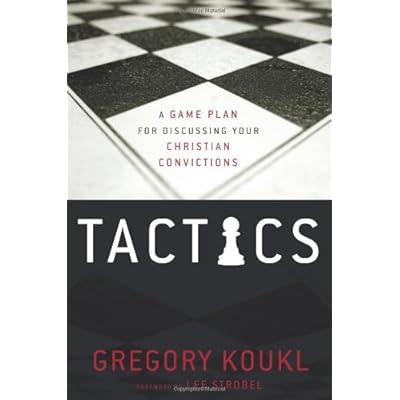
Purchase the book or read more about it here on www.str.org
Here is a brief summary of each of the main tools and chapters presented. It is worth reading the entire book because of the conversations detailed and the specific examples of each strategy.
PART ONE: THE GAME PLAN
Diplomacy or D-Day - Be diplomatic. A diplomat tries not to be offensive but will still face up to the other side rather than running away or screaming back at a challenge. Listening to an Atheist's point of view and responding firmly but gently, rather than ducking for cover or making empty accusations in return, this is the diplomat's way.
Reservations - If you have reservations about debate or argument, remember that people can disagree with each other without screaming at each other. Greg suggests that if anyone in the argument/debate gets angry, then you lose. So try and control the conversation to keep things civil. If you are calm and speak softly and controlled it is harder for your opposition to flare up. Also remember that division is okay if you are dividing the good from the bad - clearly it is good to keep Atheist ideas out when it comes to running the church. If we are searching for truth then we have to cut away that which is untrue!
Remember that you can't argue someone into the kingdom of heaven but having the right knowledge is a good start for them. It is not your responsibility to get someone converted, that's God's part in the process, you just have to step up and be willing to give it a go - defend God and his truth, and the rest will follow.
Getting in the drivers seat: The Columbo Tactic (named after TV detective Lieutenant Columbo) - Learn to recognise when to engage someone in conversation about their ideas/beliefs. If someone makes a statement that challenges Christianity or some moral view from Christianity, ask them why they think what they do. You have roughly a ten second window to engage them. Use questions because this keeps the pressure off you and on them. Using questions you can direct the discussion and it is the other person who has to think more than you. Questions lead to thoughtful dialog rather than "loud statements" for and against. It's also a good way to really learn what the other person thinks. If you don't have an answer after that, just thank them for sharing and then think about what they said to come up with a response for next time.
Often people haven't thought through some of their ideas (which may be quite ridiculous) and just asking "Why do you think that?" or "What do you mean by that?" or "Could you explain that idea further?" these questions may make them stop and realise there is no reason for believing their ideas.
A classic example is the challenge to truth: "There is no absolute truth" or "Truth is relative". You could ask if their statement that there is no absolute truth is an absolute truth, highlighting the contradiction.
Columbo step two: The Burden of Truth - Remember that others who make claims are the ones who have to defend them. Even Atheists or Pro-choice advocates have to justify their positions if they stand up and make statements. This is where questions come in handy - if you are not making statements and asking others' opinions then they have to justify their answers, not you. Use the questions "How did you come to that conclusion?" or "What evidence led you to believe that?" Never let someone change the subject when they can't answer. Always come back to the evidence for their opinion and then let them falter when they have none. Offer the Christian answers if they ask and be ready to defend the truth because you too have to defend your ideas and justify them using evidence.
Step three: Using Columbo to Lead the Way - This chapter covers a number of situations that come up, and how to respond using Colombo questions. How to respond if someone asks if non-Christians are going to hell (a straight yes, though correct, is not diplomatic. Try asking them about their understanding of justice and punishment for crimes and whether it is right to do so. Then share Jesus as a way for justice to be paid but for us to "get out of jail")
You can use questions to help someone voice something they already know, leading them through a line of reasoning.
You can use questions to ensure a safe discussion occurs, e.g. setting rules for conversation or clarifying that the other person understands we can disagree without hating each other.
Use questions to narrate the debate, e.g. "Do you realise that you just avoided answering my question?"
Don't forget to be diplomatic (nice) because it is too easy to use these tactics to beat someone rather than love them and lead them to the truth. It's not about shaming them, it's about revealing something that needs to change and then lifting them up by helping them come to the truth.
Perfecting Columbo - Step up, give it a go, reflect on each conversation and encounter and use this as ongoing practice to improve.
Check back in a few days for part two, or subscribe to receive notifications of new posts automatically.